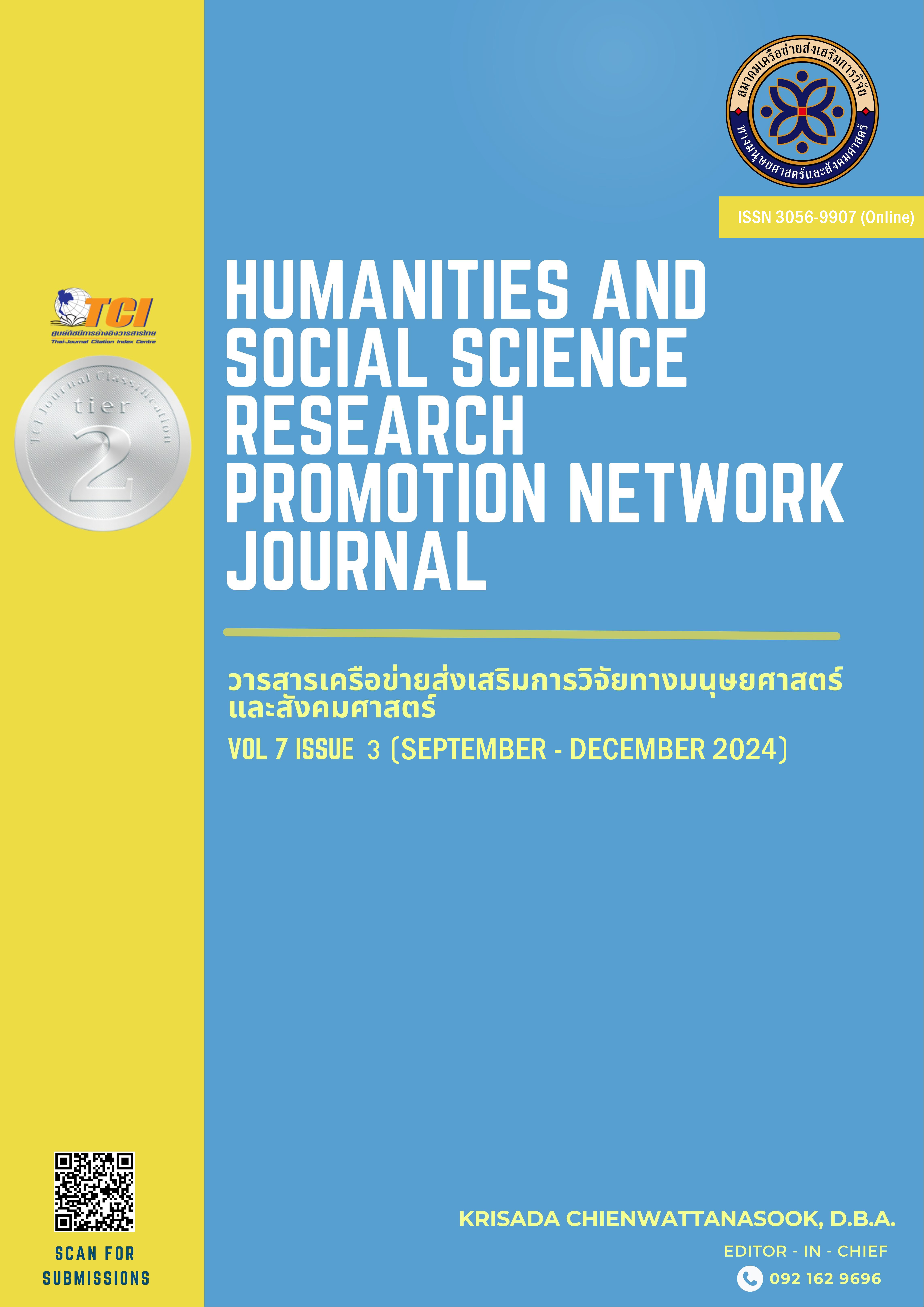ผลกระทบของปัจจัยภายนอกและภายในธุรกิจที่มีผลต่อการนำแนวคิดสีเขียว มาใช้ในกลุ่มวิสาหกิจขนาดกลางและขนาดย่อมที่มีอัตราการเติบโตสูงในเขตกรุงเทพมหานครและปริมณฑลของประเทศไทย
คำสำคัญ:
สภาพแวดล้อมทางธุรกิจภายนอก , สภาพแวดล้อมทางธุรกิจภายในองค์กร , แนวคิดสีเขียว , วิสาหกิจขนาดกลางและขนาดย่อม , SMEsบทคัดย่อ
การศึกษาครั้งนี้มีวัตถุประสงค์คือเพื่อที่จะศึกษาผลกระทบของปัจจัยภายนอกและภายในธุรกิจต่อการนำแนวทางปฏิบัติสีเขียวมาใช้ในวิสาหกิจขนาดกลางและขนาดย่อมที่มีการเติบโตสูงในเขตกรุงเทพมหานครและปริมณฑลของประเทศไทย กลุ่มตัวอย่าง คือ ผู้ประกอบการรวมถึงพนักงานจากวิสาหกิจขนาดกลางและขนาดย่อมที่มีการเติบโตสูง จำนวน 400 ราย ทำการเก็บข้อมูลผ่านแบบสอบถามที่มีโครงสร้าง วิธีการสุ่มตัวอย่าง คือ ทำการสุ่มแบบเจาะจงในการเก็บข้อมูลจากกลุ่มตัวอย่าง ทำการวิเคราะห์โดยใช้การสร้างแบบจำลองสมการเชิงโครงสร้าง ซึ่งผลการศึกษา พบว่า 1) ปัจจัยภายนอกธุรกิจมีผลต่อปัจจัยภายในธุรกิจของวิสาหกิจขนาดกลางและขนาดย่อมที่มีการเติบโตสูง (β = 0.891) 2) ปัจจัยภายนอกธุรกิจมีผลต่อการนำแนวคิดสีเขียวมาใช้ในวิสาหกิจขนาดกลางและขนาดย่อมที่มีการเติบโตสูง (β = 0.304) และ 3) ปัจจัยภายในธุรกิจมีผลต่อการนำแนวคิดสีเขียวมาใช้ในวิสาหกิจขนาดกลางและขนาดย่อมที่มีการเติบโตสูง (β = 0.655) โดยผลการศึกษานี้ช่วยให้ผู้ประกอบการและนักวิชาการเข้าใจถึงอุปสรรคที่วิสาหกิจขนาดกลางและขนาดย่อมต้องเผชิญในการนำแนวทางสีเขียวมาใช้ในองค์กร ทั้งนี้ เมื่อผู้ประกอบการสามารถขจัดอุปสรรคดังกล่าวจะช่วยเพิ่มขีดความสามารถในการปรับปรุงการนำแนวทางสีเขียวมาใช้ในวิสาหกิจขนาดกลางและขนาดย่อมได้อย่างมีนัยสำคัญ และสุดท้ายสามารถช่วยส่งเสริมการเติบโตทางเศรษฐกิจที่ยั่งยืนในประเทศไทย
เอกสารอ้างอิง
Aboelmaged, M., & Hashem, G. (2019). Absorptive capacity and green innovation adoption in SMEs: The mediating effects of sustainable organisational capabilities. Journal of cleaner production, 220, 853-863. https://doi.org/10.1016/j.jclepro.2019.02.150
Adebiyi, O., Mohamad, N., Isa, M., Samsudin, N., & Torres-Dela Cruz, M. (2020). Impact of Malaysian Green Technology Financial Scheme on Business Performance of Renewable Energy Producers. Journal of Southwest Jiaotong University, 55(6), 1-13. https://doi.org/10.35741/issn.0258-2724.55.6.19
Agyabeng-Mensah, Y., Ahenkorah, E., Afum, E., Nana Agyemang, A., Agnikpe, C., & Rogers, F. (2020). Examining the influence of internal green supply chain practices, green human resource management and supply chain environmental cooperation on firm performance. Supply Chain Management: An International Journal, 25(5), 585-599. https://doi.org/10.1108/SCM-11-2019-0405
Ahuja, J., Panda, T. K., Luthra, S., Kumar, A., Choudhary, S., & Garza-Reyes, J. A. (2019). Do human critical success factors matter in adoption of sustainable manufacturing practices? An influential mapping analysis of multi-company perspective. Journal of Cleaner Production, 239, 117981. https://doi.org/10.1016/j.jclepro.2019.117981
Amornkitvikai, Y., Tham, S. Y., & Tangpoolcharoen, J. (2021). Barriers and factors affecting E-commerce utilization of Thai small and medium-sized enterprises in food and beverage and retail services. Global Business Review, 09721509211036294. https://doi.org/10.1177/09721509211036294
Anggarini, Y., & Naufa, A. M. (2022). Growth and competitive analysis of SMEs in Sleman, Indonesia. Journal of Advanced Multidisciplinary Research, 3(2), 115-127. http://dx.doi.org/10.30659/JAMR.3.2.115-127
Barney, J. (1991). Firm resources and sustained competitive advantage. Journal of Management, 17(1), 99-120. https://doi.org/10.2307/259056
Cochran, W. G. (1977). Sampling techniques (3rd ed.). John Wiley & Sons.
Cheraghalizadeh, R., Olya, H., & Tumer, M. (2021). The effects of external and internal factors on competitive advantage—moderation of market dynamism and mediation of customer relationship building. Sustainability, 13(7), 4066. https://doi.org/10.3390/su13074066
Dangelico, R. M., & Pujari, D. (2010). Mainstreaming green product innovation: Why and how companies integrate environmental sustainability. Journal of Cleaner Production, 18(8), 675-688. https://doi.org/10.1016/j.jclepro.2010.02.014
Elkington, J. (1997). Cannibals with forks: The triple bottom line of 21st century business. Oxford: Capstone.
Elshaer, I. A., Azazz, A. M., & Fayyad, S. (2023). Green management and sustainable performance of small-and medium-sized hospitality businesses: moderating the role of an employee’s pro-environmental behaviour. International Journal of Environmental Research and Public Health, 20(3), 2244. https://doi.org/10.3390/ijerph20032244
Fahad, S., Alnori, F., Su, F., & Deng, J. (2022). Adoption of green innovation practices in SMEs sector: evidence from an emerging economy. Economic research-Ekonomska istraživanja, 35(1), 5486-5501. https://doi.org/10.1080/1331677X.2022.2029713
Ghosh, M. (2019). Determinants of green procurement implementation and its impact on firm performance. Journal of Manufacturing Technology Management, 30(2), 462-482. https://doi.org/10.1108/JMTM-06-2018-0168
Hair, J. F., Risher, J. J., Sarstedt, M., & Ringle, C. M. (2019). When to use and how to report the results of PLS-SEM. European business review, 31(1), 2-24. https://doi.org/10.1108/EBR-11-2018-0203
Ibrahim, E. B., & Harrison, T. (2020). The impact of internal, external, and competitor factors on marketing strategy performance. Journal of Strategic Marketing, 28(7), 639-658. https://doi.org/10.1080/0965254X.2019.1609571
Johnstone, L., & Hallberg, P. (2020). ISO 14001 adoption and environmental performance in small to medium sized enterprises. Journal of environmental management, 266, 110592. https://doi.org/10.1016/j.jenvman.2020.110592
Jun, W., Ali, W., Bhutto, M. Y., Hussain, H., & Khan, N. A. (2021). Examining the determinants of green innovation adoption in SMEs: A PLS-SEM approach. European Journal of Innovation Management, 24(1), 67-87. https://doi.org/10.1108/ejim-05-2019-0113
Junejo, I., Saraih, U. N., Perez, J. A. E., Ejaz, S., Ejaz, F., & Hossain, M. B. (2024). Factors Affecting on Environmental Strategy in SMEs manufacturing Firms of a developing country: Mediating role of Green Employee Behavior. F1000Research, 13, 654. https://doi.org/10.12688/f1000research.152351.1
Korwatanasakul, U. & Paweenawat, S.W. (2020). Empowering Thai SMEs to join global value chains: Policy priorities under COVID-19. https://www.asiapathways-adbi.org/2020/07/empowering-thai-smes-join-global-value-chains-policy-priorities-under-covid-19/
Li, Y., Ye, F., Dai, J., Zhao, X., & Sheu, C. (2019). The adoption of green practices by Chinese firms: Assessing the determinants and effects of top management championship. International Journal of Operations & Production Management, 39(4), 550-572. https://doi.org/10.1108/IJOPM-12-2017-0753
Masoumik, S. M., & Abdul-Rashid, S. H. (2021). The Role of Green Strategy Adoption in Driving Green Supply Chain Management Practices. In Strategic Responses for a Sustainable Future: New Research in International Management (pp. 21-48). Emerald Publishing Limited.
Noranarttakun, P., & Pharino, C. (2021). How does the green industry policy impact a developing country? A case study of the electronic products and electrical equipment manufacturing sector in Thailand. Environment and Natural Resources Journal, 19(5), 402-412.
Pakurár, M., Haddad, H., Nagy, J., Popp, J., & Oláh, J. (2019). The service quality dimensions that affect customer satisfaction in the Jordanian banking sector. Sustainability, 11(4), 1113. https://doi.org/10.3390/su11041113
Piyathanavong, V., Garza-Reyes, J. A., Kumar, V., Maldonado-Guzmán, G., & Mangla, S. K. (2019). The adoption of operational environmental sustainability approaches in the Thai manufacturing sector. Journal of Cleaner Production, 220, 507-528. https://doi.org/10.1016/j.jclepro.2019.02.093
Porter, M. E. (1985). Competitive strategy: Techniques for analyzing industries and competitors. Free Press.
Satchapappichit, S. (2020). Factors Influencing Chinese Visitors’ Dining Experiences with Thai Cuisine In Bangkok, Thailand. ABAC Journal, 40(4), 58-77.
Setyaningsih, I., Ciptono, W. S., Indarti, N., & Kemal, N. I. V. (2021). Do all the green manufacturing adoption drivers have the same influence?(survey study of Indonesian batik textile SMEs). In Proceedings of the International Conference on Industrial Engineering and Operations Management (pp. 990-1001). IEOM Society.
Susanty, A., Sari, D. P., Rinawati, D. I., & Setiawan, L. (2019). The role of internal and external drivers for successful implementation of GSCM practices. Journal of Manufacturing Technology Management, 30(2), 391-420. https://doi.org/10.1108/JMTM-07-2018-0217
Thailand Development Research Institute. (2024). Revamp policies to boost Thai SMEs. https://tdri.or.th/en/2024/08/revamp-policies-to-boost-thai-smes/
Vithayaporn, S., Nitivattananon, V., Sasaki, N., & Santoso, D. S. (2023). Assessment of the factors influencing the performance of the adoption of green logistics in urban tourism in Thailand’s Eastern Economic Corridor. Social Sciences, 12(5), 300. https://doi.org/10.3390/socsci12050300
ดาวน์โหลด
เผยแพร่แล้ว
รูปแบบการอ้างอิง
ฉบับ
ประเภทบทความ
สัญญาอนุญาต
ลิขสิทธิ์ (c) 2024 เมทินี รัษฎารักษ์, ปวริศา เอมโอฐ, ศรากุล สุโคตรพรหมมี

อนุญาตภายใต้เงื่อนไข Creative Commons Attribution-NonCommercial-NoDerivatives 4.0 International License.
บทความที่ได้รับการตีพิมพ์เป็นลิขสิทธิ์ของ ผู้เขียน
ทัศนะและความคิดเห็นที่ปรากฏในบทความในวารสารเครือข่ายส่งเสริมการวิจัยทางมนุษยศาสตร์และสังคมศาสตร์จะถือเป็นความรับผิดชอบของผู้เขียนบทความนั้น และไม่ถือเป็นทัศนะและความรับผิดชอบของกองบรรณาธิการ








